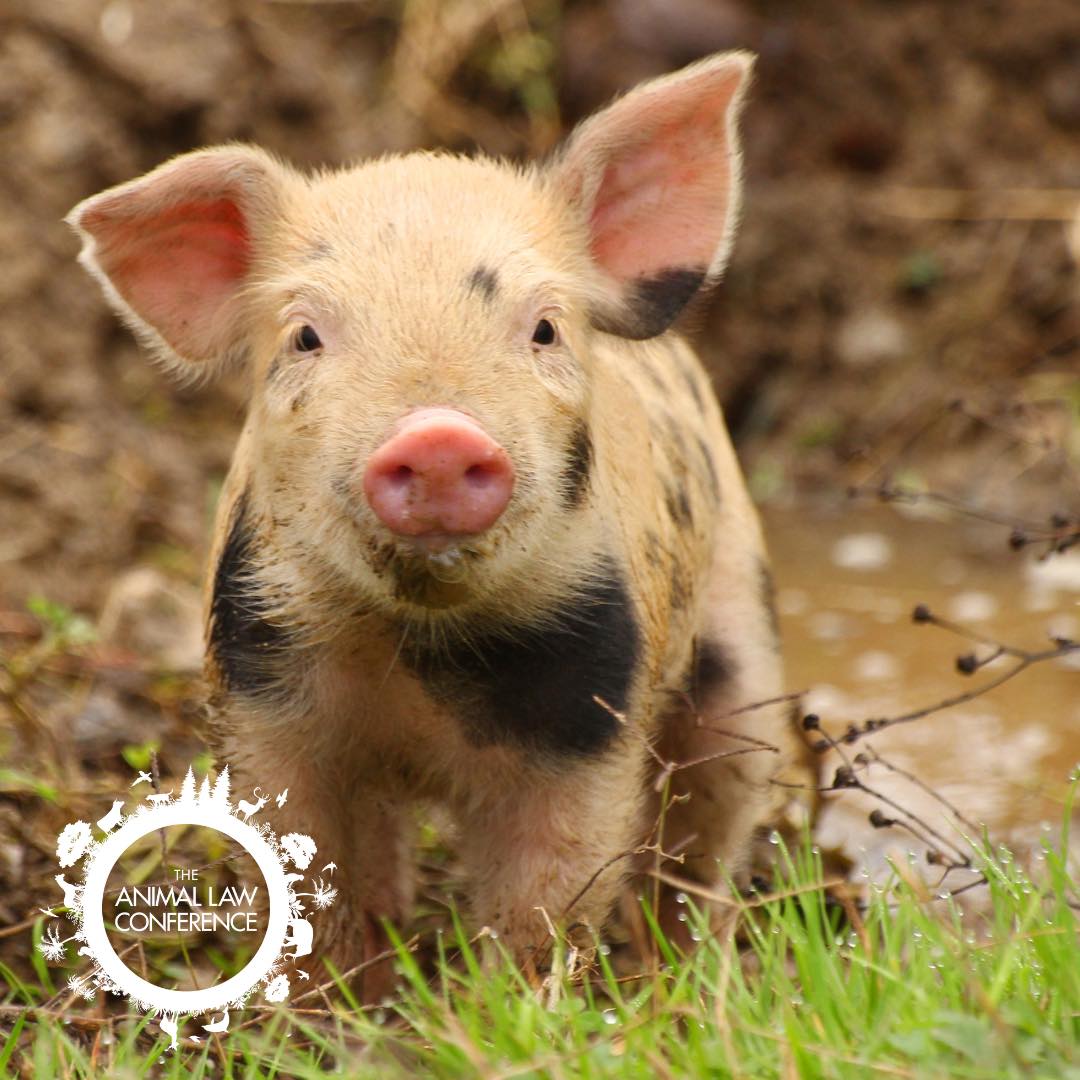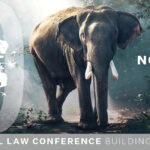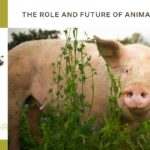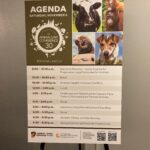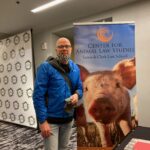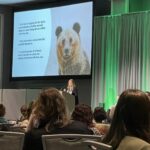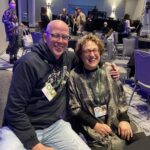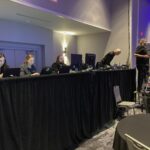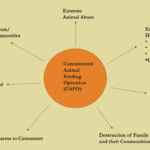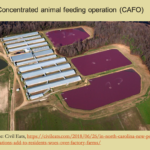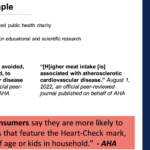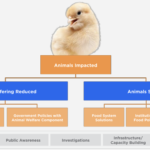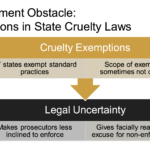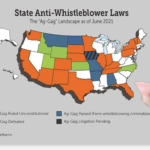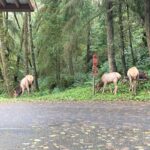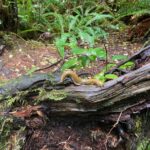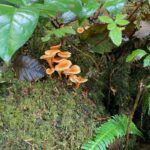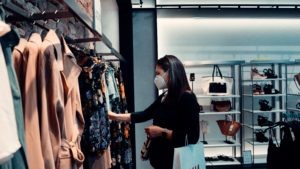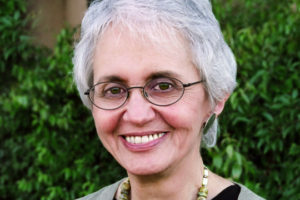Have you heard of the Animal Law Conference? I recently attended its 30th annual gathering in Portland, Oregon, and I had a wonderful time as I met a lot of bright and dedicated people who are truly inspirational. The conference is hosted and supported by the Lewis & Clark Law School and the Animal Legal Defense Fund, and each year it continues to grow in size and popularity. In fact, it has grown so much that the conference is now considered to be the preeminent event in the field of animal law today! Wow. I also had the good fortune of taking a day to visit the magnificent Oregon coast, which did not disappoint. Basically, I only have one word to describe that part of our planet, Wowee! And yes, for those who may be wondering, Wowee is an official Scrabble word!
The bottom line? The 30th Annual Animal Law Conference was fantastic. Thank you again to all of the organizers and sponsors for a truly remarkable event. I am so grateful to have had the opportunity to meet so many inspiring and lovely people from different parts of the world. It was also an honor to have met “the Mother of Animal Law” herself, Joyce Tischler, as well as Dr. Lori Marino, who were both delightful, and generous with their time. I knew that I would be learning a lot and possibly getting emotional at times, but I didn’t expect to laugh so much too. Also, kudos to the caterers and planners for the conference’s cruelty free vegan food which was terrific as well! (see pics below). 🙂
Okay, so here are some of the biggest takeaways from the 30th Annual Animal Law Conference:
Welcome Video (Jane Goodall)
The 3 day event was kicked off with a video from one of my favorite people on the planet, Dr. Jane Goodall. Ms. Goodall started off by informing us that Spiders are intelligent, and have dreams. I knew that they were intelligent, but I had no idea that they had dreams, or how to draw those types of conclusions. Dr. Goodall has a Roots and Shoots program that is active in 65 countries, and she reminded us how important collaboration can be as animal abuse is widespread and everyone is needed in the fight.
Click here to learn more about spiders and dreams.
Click here for the Jane Goodall Institute.
Click here for the Jane Goodall Institute of Canada.
Click here for a link to the Roots and Shoots website.
Click here for the Non-Human Rights Project website.
Using Science for Progressive Legal Outcomes for Animals
Speakers:
Dr. Lori Marino, Founder, President, The Whale Sanctuary Project; Director, Kimmela Center for Science-Based Animal Advocacy
Dr. Rebecca Ledger, Animal Behavior & Animal Welfare Scientist
Dr. Lori Marino: The Jane Goodall Act (Bill S-218), is a landmark piece of legislation that would prohibit the confinement, breeding, and importing of wild animals in captive facilities throughout Canada (including elephants). It would also strengthen an existing but flawed ban on the importation of elephant ivory and other hunting trophies and would grant legal standing to great apes, elephants, whales, and dolphins (Granting animals legal standing would be a watershed event that would transform the landscape of animal protection in Canada). The speakers also talked about the SWIMS Act which would protect Orca & Beluga whales by banning their export or import for public display in captivity. Dr. Marino taught at Emory University for twenty years and she explained how many of these academic institutions brainwash their young scientists into believing that they cannot become animal advocates (in an effort to discourage them from challenging the harmful practices of the status quo). She convincingly explained that contrary to what the institutions and industries would like these students to believe, scientists actually make the BEST advocates, and are often needed to explain the science to judges who are not equipped with the same level of knowledge and experience.
Click here for the Whale Sanctuary Project.
Click here for the Kimmela Center for Science Based Animal Advocacy.
Click here to learn more about the Jane Goodall Act.
Click here to learn more about the SWIMS Act and other animal law cases.
Click here to learn more about Dr. Lori Marino.
Click here to learn more about Dr. Rebecca Ledger.
Animals Caught in Human Conflicts
Speakers:
Rachael Bale, Former Executive Editor of Animals, National Geographic
Gladys Kamasanyu, Chief Magistrate, Uganda Wildlife Court
Taylor Tench, Senior Wildlife Policy Analyst, Environmental Investigation Agency
Rachael Bale: Human conflict has a wide ranging effect on animals. For example, the use of Agent Orange killed not just millions of people, but also millions of animals. Additionally, bombs and explosives kill habitats and destroy soil and water. Ms. Bale also referenced the human violence in Virunga National Park in the Congo where 12 rangers were among 17 people killed by an armed Rwandan rebel group. Virunga National Park is home to lions, hippos, elephants and mountain gorillas.
Click here for a link to the Virunga National Park.
Click here to learn more about the Virunga National Park massacre.
Click here to learn more about Rachael Bale.
Gladys Kamasanyu: Everything humans do affects the natural world and animals (conflict, space, food).
– Africa’s only specialized wildlife court
– Unlimited jurisdiction in Uganda
– Over 2,000 cases registered
– We all have a role to play, Animals do not speak, Let us speak for them, Let us speak for humanity
Click here to learn more about Gladys Kamasanyu from the Lewis & Clark Law School.
Taylor Tench: The 3 species of orangutans, Bornean, Sumatran, and Tapanuli are all endangered.
– There are less than 800 Tapanuli orangutans left in the world, which is down from thousands
– Habitat loss, illegal killing, industrialization, and new roads have given people even more access to Orangutans
– 2,300 orangutans are killed by people each year (between 5-8 per day) either by random encounters, out of fear or for meat, or just intentionally for sport.
– Orangutans are forced to search for food when their habitats are destroyed, and there is a conflict with people when they end up eating crops.
– A reduction of 1% of the population can be devastating, as female orangutans only give birth once every 8 years.
– Orangutans are found only in the rain forests of the Southeast Asian islands of Borneo and Sumatra, which are both in Indonesia.
– There are over 1,000 crimes committed against orangutans each year, but there have only been 4 convictions in Indonesia. There is just no regard for orangutans.
– Indonesia lies, like all governments, and is corrupt and highly sensitive. Indonesia refuses to accept criticism or responsibility.
Click here to learn more about orangutans.
Click here for the Environmental Investigation Agency website.
Challenges and Opportunities Lawyers Face Today in Advocating for Farmed Animals
As per the Animal Law Conference (ALC) website, “Animal advocates are at a pivotal moment to change the future for farmed animals. The plight of countless terrestrial and aquatic animals who are suffering in animal agriculture is a daunting challenge that must be addressed. This panel will focus on the role of legal professionals in farmed animal protection and discuss possible paths forward to bring about a better world for farmed animals in the next 30 years.”
Speakers:
Leah Garcés, President, Mercy for Animals
Piper Hoffman, Senior Director of Legal Advocacy, Animal Outlook
Joyce Tischler, Professor of Practice, Animal Law, Lewis & Clark Law School; Founder, Animal Legal Defense Fund & The Mother of Animal Law!
Leah Garcés: Mercy for Animals (MFA) is 23 years old, and has offices in Mexico, Brazil, Hong Kong, and the United States.
– The mission of Mercy for Animals is to end industrial agriculture, as 80 billion factory animals are slaughtered each year
– Leah has been working for MFAfor over 20 years, and has 3 passports (US, Colombian, British)
– Proposition 12 is a farmed animal protection law requiring improved minimum housing standards for mother pigs in the pork industry, hens used in egg production, and calves raised for veal. In addition to updating minimum space requirements for animals raised in California, Prop 12 also requires that pork, eggs, and veal that are imported into California from out of state meet the same standards.
– The Pork Industry fought aggressively and now Prop 12 is before the Supreme Court
– New Undercover Investigation – Animals Under Attack (100 undercover investigations)
– MFA has conducted corporate pressure campaigns
– Mercy for Animals is being sued by many companies in Brazil for using their logos and their names
– Ag Gag Laws challenge Mercy for Animals as their graphic of the US “State Anti-Whistleblower Laws (the Ag Gag landscape as of June2021) shows.
– Leah wrote a book called “Grilled, Turning Adversaries into Allies to Change the Chicken Industry.”
– Most animal factory owners don’t want to be in the industry (as per Leah’s book)
– MFA has a ton of jobs on their website, as well as volunteer events
– Job interview advice? Find the intersection between what you’re good at and what you’re passionate about.
– When hiring, optimism is important to Leah, as well as grit. How would you react after a failed campaign? IF the candidate says I will take time off, and be sad, then there would be no grit. A better response would be to say that we are going to analyze where we went wrong, double down on what we did right, and so on. Grit.
– People’s Fund through Mercy for Animals.
– Leah has two TED Talks. “We have to be comfortable being uncomfortable. Talking to people who agree with us, will not get us to the solution…When we sit down to negotiate with the enemy, we need to remember that there is a human being in front of us who very likely has more in common with us than we care to admit.”
– Singapore is the only country to approve cultivated meat. It is for people who are stubborn and want to eat meat for the rest of their lives.
– Cultivated meat is an important solution, and we should all stand by it (and remember that a lot of people refuse to be vegan).
– Farmer transition programs. A very real shift for Mercy for Animals is to not prosecute animal factory workers. They hold the Tysons of the world accountable, rather than the workers and animal factory farmers.They only hold the parent company responsible as they are looking for a bigger transitional change.
– 6-10 big non profit organizations have only $150 million vs. animal agriculture and animal factories that have hundreds of billions of dollars at their disposal.
– We need a big breakthrough moment. Of the environmental philanthropy goes to animals, less than 2% goes to farmed animals.
– Mercy for Animals, Humane League, and other organizations are mentioned in a NY Times article (see below).
– Leah tells the story of Norma the cow, who went through nine pregnancies, and attacked a farmworker who had to be hospitalized when he tried to take away her baby. Norma was scheduled for death but a farmworker pleaded for Norma’s life and with the help of his girlfriend, found Vine Sanctuary in Vermont, where Norma & Nina are currently living happily ever after.
Click here to learn more about Proposition 12.
Click here for a link to Leah’s book “Grilled, Turning Adversaries into Allies to Change the Chicken Industry.
Click here for a link to The People’s Fund by Mercy for Animals (which offers free legal advice).
Click here for the Mercy for Animals website.
Click here for Leah’s excellent TED Talk called “Turning Adversaries into Allies.”
Click here for the Mercy for Animals video that was originally shared through the NY Times.
Click here for another superb TED Talk from Leah called “Lessons on Resilience from a Rescue Chicken.”
Click here for the NY Times article that references Mercy for Animals and the Humane League.
Click here for a link to the Humane League website.
Click here for the Vine Sanctuary website.
“Do not be daunted by the enormity of the world’s grief. Do justly NOW. Love mercy NOW. Walk humbly NOW. You are not obligated to complete the work but neither are you free to abandon it.” – Ancient Jewish Teaching from the Talmud
Piper Hoffman: Animal Outlook is a nationwide non profit that works for the abolition of animal factories.
– Animal Outlook performs a lot of undercover investigations
– Animal Outlook has filed a lawsuit against the American Heart Association (AHA) over its use of Heart-Check labels on certain meat products. The AHA has been taking payment from meat companies in exchange for its “heart healthy” product certifications.
– Animal Outlook has stated that the AHA’s decision to label certain meats as heart-healthy goes against its previous statements on the matter. Two out of five consumers say they are more likely to purchase foods that have the AHA Approved label.
– Some cases win the fees for legal efforts too. Private firms will be more likely to take on future cases as a result.
– Enforcement obstacle – Cruelty Exemptions
– 37 states exempt standard practices which leads to uncertainty and prosecutors being less inclined to enforce animal protection laws
– Animal Outlook has a farm transition program that is run by T.J. Bradford, PhD
– Cultivated meat – we need all ideas and strategies to close all animal factories once and for all
– External costs have to be a part of our strategy moving forward
Click here to learn more about Animal Outlook’s lawsuit against the American Heart Association.
Click here for the Animal Outlook website.
Click here to learn more about Animal Outlook’s farm transition program from Dr. T.J. Bradford.
Click here to learn more about external costs from Dave Simon, and his book “Meatonomics”.
Click here to learn more about cultivated meat from the Good Food Institute.
Click here to learn more about Piper Hoffman.
Joyce Tischler: The Mother of Animal Law!
– Concentrated Animal Feeding Operations (CAFOs) are built in low income communities where a disproportionate number of people are non-white
– In North Carolina, legislators passed new laws restricting the right to speak up about harm caused by CAFO waste.
– The confined animal feeding operations (CAFOs) that house most of the state’s 9.5 million hogs store the animals’ waste in large, open-air lagoons that together hold enough fluid to fill 15,000 Olympic-sized swimming pools. To prevent the lagoons from overflowing, the farm operations periodically dispose of the waste by spraying it onto nearby fields.
– 168 gases are emitted from CAFOs and their lagoons
– CAFOs are a form of environmental injustice and cause Respiratory diseases, Asthma, Nausea, Gastro-intestinal problems, Headaches, Noise at all hours, Odors, Avoidance of yards and being outdoors, Lower home values, Local economy’s to suffer
– CAFOs treat the people, animals, workers, and communities horribly
– Challenges can be opportunities
– As per the book CAFO, The Tragedy of Industrial Animal Factories, “The environmental costs of CAFO production have been well documented. Manure spills and leakages have contaminated waterways, killing fish and fouling fisheries…environmental laws governing CAFO pollution are still not fully enforced in many states and regions of the country and the industry continually lobbies for less regulation.”
– As per the EPA, “The Resource Conservation and Recovery Act (RCRA) gives EPA the authority to control hazardous waste from the “cradle-to-grave.” This includes the generation, transportation, treatment, storage, and disposal of hazardous waste.”
– McKiver v. Murphy Brown, Nuisance: a substantial and unreasonable interference with a person’s right to use and enjoy their land or property. The jury awarded the neighbor/plaintiffs of pig animal factories, $75,000 in compensatory damages per plaintiff and $5 million in punitives, which was later reduced to $2.5 million to comply with North Carolina’s statutory cap on punitive damages. On appeal, the Fourth Circuit affirmed the jury verdict as to liability for compensatory and punitive damages, but vacated the punitive damages award and remanded the case for retrial solely on this issue of the proper amount of punitive damages without consideration of evidence of the parent company’s finances.
– “It is past time to acknowledge the full harms that unreformed practices of hog farming are inflicting.” ~Judge Wilkinson, Concurring Opinion
– Animal grants are a reality, the field is growing, the funding is growing.
Click here to learn more about CAFO waste in North Carolina.
Click here to learn more about the Resource Conservation and Recovery Act (RCRA).
Click here for a video clip from the excellent film “What the Health” on the catastrophic impact of CAFOs.
Click here to learn more about the McKiver vs. Murphy Brown case.
Click here for a link to the Animal Legal Defense Fund.
Click here to learn about Joyce Tischler from the Animal Legal Defense Fund.
Click here to learn more about Joyce Tischler from the Lewis and Clark Law School (Center for Animal Law Studies).
Deconstructing Personhood and Standing
Speakers:
Karen Bradshaw (video), Professor of Law and Mary Sigler Fellow, Sandra Day O’Connor College of Law, Arizona State University
Ariel Flint, Staff Attorney, Animal Legal Defense Fund
Macarena Montes Franceschini, PhD in Law, Universitat Pompeu Fabra, Spain
Moderator: David Rosengard, Managing Attorney, Animal Legal Defense Fund
Macarena Montes Franceschini & Ariel Flint: Animals can have personhood and legally be considered people.
– Some 100 of drug kingpin Pablo Escobar’s hippos, descended from a herd smuggled into Colombia. The hippos are now recognized by a U.S. court as “interested persons” following a decision this month that is believed to be the first of its kind in the United States.
– The Animal Legal Defense Fund has called the ruling by a judge in the U.S. District Court for the Southern District of Ohio a “critical milestone” in its larger effort to have the American legal system recognize “enforceable rights” for animals.
– The Animal Legal Defense Fund filed a groundbreaking lawsuit in Oregon state court on behalf of an 8-year-old horse named Justice, against Gwendolyn Vercher, who neglected him. The lawsuit seeks to recover the costs of Justice’s ongoing medical care and to compensate him for his pain and suffering. If successful, this lawsuit would be the first to establish that animals have a legal right to sue their abusers in court (aldf.org).
Click here to learn more about Escobar’s “cocaine hippos” being legally recognized as people.
Click here to learn more about “Justice” the horse from the Animal Legal Defense Fund.
David Rosengard: Mona the dog, was stomped to death by the boyfriend of her owner in the state of Washington. A Ms. Fairbanks was a victim because Mona was killed to create emotional stress to her, which is a form of domestic violence.
– Control and harm your partner by killing her dog? What about Mona?
– On February 8, 2022, the Washington State Supreme Court issued a decision in the case State v. Charmarke Abdi-Issa, holding that animal cruelty could be designated a crime of domestic violence, and that an animal’s guardian could be considered a victim of the crime. The Animal Legal Defense Fund submitted an amicus curiae brief (a friend of the court) in this case, and several arguments raised in the brief were cited in the Court’s decision…The question of who is a “victim” in this case is a deceptively simple one. Intuitively, we know the individuals who suffered as a result of this crime and who deserved justice were Mona and Fairbanks. Therefore, in the colloquial sense of the word, Mona and Fairbanks were both victims of this crime. However, the legal issues in this case were governed by Washington’s Sentencing Reform Act, a piece of legislation which has a specific definition of the term “victim.” That definition states that a “victim” is “any person who has sustained emotional, psychological, physical, or financial injury to person or property as a direct result of the crime charged.” Because the definition uses the word “person,” and because animals have yet to be recognized as legal persons in Washington State courts, only human beings may be termed “victims” for the purpose of the Sentencing Reform Act. Therefore Mona, despite clearly being the one who suffered most in this case, was not legally considered a “victim” for the specific issues in this case, brought under the Sentencing Reform Act (aldf.org).
– We have animal protection laws not to protect owners, but to protect the animals because each being is someone, and should not be subjected to cruelty.
– Animals have the right to be protected from unlawful cruelty.
– Animal cruelty law applies to each victim separately. Example: If six beers are stolen, a six-pack or all beers can collapse into one theft. This doesn’t work with animal cruelty laws.
Click here to learn more about the Washington State Supreme Court ruling that animal cruelty can be a crime of domestic violence.
Animals, Ethics, and the Attorney
Speaker:
Russ Mead, The Shared Earth Foundation Visiting Professor, Center for Animal Law Studies at Lewis & Clark Law School
– Wild Free-Roaming Horses and Burros Act. This applies to public lands, Animal community is split on how to help the horses
Click here to learn more about the protections of wild horses.
Keynote Presentation
Miyoko Schinner, Founder and CEO, Miyoko’s Creamery
The Brooks Institute for Animal Rights Law and Policy, sponsored the Banquet Dinner.
The Future of Animal Law Education & Youth Advocacy
As per the ALC website, “The fields of animal law education and youth advocacy have exploded in the past thirty years. What began as less than a handful of animal law courses in 1992, has grown to more than 160 animal law courses at American Bar Association accredited law schools today.”
Speakers:
Kathy Hessler, Assistant Dean, Animal Law Education; Director, Animal Legal Education Initiative, The GW Law School
Claire Howe, Executive Director, The Raven Corps
Rajesh Reddy, Director, Animal Law Program, Center for Animal Law Studies at Lewis & Clark Law School
Kathy Hessler: – We need to be able to measure how far we have come and how far we need to go.
– Value statements are critical to promote conversations and raise awareness, and for the subject to be taken seriously
– Her students have written bills
– Animal Law, Gender Law are both critical
– George Washington University has an animal law program
– Advocates are facing incredible challenges
– Many people have a lack of faith in our institutions law, and government
– We need to celebrate our successes more, and learn from our failures too
– We have not been successful in convincing other law schools that animals are already a part of environmental law and other law programs
– Do whatever it is that you can do, and recognize the capacity that you have and the space that you are in and work with that
Click here to learn more about Kathy Hessler.
Claire Howe:
– Co-founder Raven Corps which is comprised of mostly youth activists, ages 15-22
– According to the Raven Corps website, “The Raven Corps is a youth-centered movement of activists devoted to building a just and sustainable future for ALL animals and our natural world. We take action through a consistent anti-oppression lens and trust that we can achieve liberation for ALL if we join forces and strike at the roots of oppression.”
– Claire Howe went to law school, but wasn’t interested in being a lobbyist. She is an LLM inaugural graduate.
– She volunteers with HEART (Humane Education Advocates Reaching Teachers), and is the human resource program manager
– She facilitated animal rights groups for NYC high schools
– She rebranded and became an organization for social justice issues
– Started a program to make plant based milk more accessible for public school children
– We need classroom law programs, Factory Farming awareness programs, as well as Farm Sanctuaries
– Students see their food options as a political issue, What are the causes?
– White supremacy, and capitalism are the root causes of oppression
– Social media has changed the movement, as a grind culture is not sustainable for mental health
– Claire feels like a broken record sometimes, and believes that we need to think more politically
– Our society is rooted in exploitation and the commodification of animals and our natural world
– Reduce the voting age to 16, the answer is not just to go vegan as the problem is systemic
– What can we do? Direct action, and volunteering
Click here for a link to the Raven Corps website.
Click here for the HEART website (TeachHeart.org)
Click here for the Raven Corps’s “Mind Over Milk” website.
Click here to learn more about Claire Howe.
Rajesh Reddy:
– Change starts with students.
– Joyce Tischler, and the students started an Animal Law Review & Animal Law Program (Lewis and Clark)
– The Center for Animal Studies was born
– Where can we do this? The Global Ambassador Program
– How do we replicate this program in other countries? Animal Law courses are now taught in Zimbabwe, Pakistan, and S. Africa
– GW, Lewis and Clark, Harvard Law School all offer animal law programs
– Historic challenges, pandemics, climate crisis, animal law. The curriculums do not reflect what the students are facing
– Animal law education needs to taken seriously, and expanded
– What is animal law? And where do you want to teach it?
– Not much literature on the subject
– Lewis and Clark welcomes students from all over, including China, New Zealand, France, S. Africa, etc.
– Students learn how animal law can be taught, and take that knowledge back home and create some of the first animal law courses and programs
– Gen Z is the most diverse, what pathways do we have for young animal advocates?
– Ask folks what is it that they need? And what is it that we can do to help?
Click here to learn more about Rajesh Reddy.
The Importance of Considering Animals in Political Campaigns
As per the ALC website, “As recognition grows that animals are sentient and have their own interests, society is beginning to demand that animal welfare is considered not just in legislation but also in political campaigns.”
Speakers:
Assemblyman Dan Benson, New Jersey’s 14th District, New Jersey Legislature
Solomon Malick, President, Peak Government Affairs
Honorable Emma Hurst (video), Member of the Legislative Council, Animal Justice Party, Parliament of New South Wales
Jake Kamins, Animal Cruelty Deputy District Attorney, Benton County District Attorney’s Office
Dan Benson: Persistence, show Big Ag that you are not going away
– We try to pass laws to promote equity for all animals as animals are animals
– Why is it okay to abuse a horse, but not a dog and cat?
Emma Hurst: She is lobbying for an 8 fold increases in penalties and doubled jail time for those who commit animal cruelty
Jake Kamins: Advice on having an impact? Run for office yourself
– Work on a campaign first, or volunteer to work on a campaign
Solomon Malick: Animals are sentient beings capable of fear, pain and suffering
Crimes Against Animals: Innovative Outcomes for Animals and People
As per the ALC website, “The animal law movement has for the most part been successful in showing people animal cruelty is a problem—the new challenge is to figure out the best path forward. A dynamic and evolving area of focus is creating targeted criminal justice outcomes to better help animal victims, prevent future crimes against animals, and build healthier and more resilient communities.”
Speakers:
Jessica Chapman, Criminal Justice Program Fellow, Animal Legal Defense Fund
David Rosengard, Managing Attorney, Animal Legal Defense Fund
Philip Tedeschi, Executive Director, Institute for Human-Animal Connection; Clinical Professor, University of Denver Graduate School of Social Work
The Role and Future of Animal Sanctuary
As per the ALC website, “Animal sanctuaries not only provide safety, enriching space, and care for animals, they also serve an important role in educating the public about the cruelty and neglect that the animals may have faced before coming to sanctuary.”
Speakers:
Gwen Jakubisin, Executive Director, Lighthouse Farm Sanctuary
Megan Senatori, Associate Director and Adjunct Professor, Center for Animal Law Studies at Lewis & Clark Law School; Co-Founder & President, Sheltering Animals of Abuse Victims (SAAV), Center for Law Studies
Cristina Stella, Staff Attorney, Animal Legal Defense Fund
Gwen Jakubisin:
– Gwen tries to tell each animal story, and show how unique each animal can be
– Animals are not commodities or products, and deserve to be protected
– Running a farm sanctuary is not just hugging animals and breathing in fresh air, it is also a lot of hard work, sweat, disappointment, and always educational
– Often the rescue animals have broken bodies and spirits, we just try give them the life they deserve no matter how short or long
– Standardization as far as safety, care, and cleanliness is being worked on, but as of now there is very little uniformity amongst sanctuaries
Megan Senatori: – What would you do if the cost of your own personal safety meant leaving a loved one behind?
– 1 in 4 women, and 1 in 10 men experience domestic abuse
– The safety of humans and animals are dependent on one another when abuse is occurring
– 30 years ago there were no laws protecting animals in cases of domestic abuse, but today there are over 1,000 shelters in the US that are providing shelter for animals
– 39 states now have laws that protect animals in domestic abuse cases
– “Household pet” means a domestic animal is not a farm animal”, “animal cruelty can constitute domestic violence”
– There are co-shelters in NYC where animals and people can live together
– It is a question of resources, and not about not caring
– Pet and Women safety act of 2017, was part of the 2018 Farm Bill
– Purina’s Purple Leash Project, the Purple Leash Project assists domestic violence shelters in their journey to welcome family pets by funding pet-friendly renovations
– Megan teaches a companion animal law class
– Hurricane Katrina child throwing up over having to leave his pet fluffy
– What about natural disasters, and homelessness?
– Story telling and the sharing of these stories, are how laws get developed
Click here for a link to the “Sheltering Animals of Abuse Victims (SAAV)” website.
Click here to learn more about the Pet and Women Safety (PAWS) Act.
Click here to learn more about Purina’s Purple Leash Project.
Click here for a powerful (tear jerking) video, Nate’s Hurricane Katrina Rescue, from the Oprah Winfrey Network.
Cristina Stella:
– Where are we rescuing animals? Roadside zoos often exhibit wild and exotic animals
– It is common to find dirty cages, inadequate food, no medical care, and no mental stimulation
– These places exist to make money, and entertain the public
– There are no background checks, as owners don’t need any experience with animals or other credentials to operate their so-called businesses and provide proper care
– Animal Welfare Act (AWA) – primary federal law, but it doesn’t apply to all animals
– Animal Plant Inspection Service? Warning letters, cease and desist, USDA often does not do much as they let things slide and protect their “customers”
– USDA rarely closes these places down, and rarely concerns itself for the welfare of the animals.
– Revoke and Run is what the USDA does
– AWA mandates are ignored
– USDA only allows for confiscation in rare cases
– Cricket Hollow’s Zoo is a Roadside zoo in Iowa. USDA finally closed them down but did not confiscate animals and never took action to help the animals.
– Animal Legal Defense Fund led six lawsuits against Cricket Hollow Zoo
– Revoke and Run legislation
– ALDF sued USDA for their disregard for animal welfare
– Should sanctuaries be allowed to breed animals?
Click here to learn more about AWA (Animal Welfare Act).
Click here to learn more about the lawsuits against Cricket Hollow Zoo by the Animal Legal Defense Fund.
Click here to learn more about the lawsuit that the Animal Legal Defense Fund filed against the USDA regarding its “revoke and run” policies.
Challenges and Opportunities in Transitioning Away from Using Animals in Research
As per the ALC website, “Within the arenas of law and science, there is much work that can be done to make advancements for the benefit of both animals and humans.”
Speakers:
Christopher Berry, Managing Attorney, Animal Legal Defense Fund
Dr. Paul Locke, Associate Professor, Johns Hopkins University
Lenore Montanaro, Attorney and Writer
Lastly, while in Portland, I visited the impressive Powell’s Books which takes up a whole city block and claims to be the largest independent bookstore in the world. And as mentioned above, I also took an extra day to visit the overwhelmingly gorgeous Oregon Coast, which left me speechless. I have only felt that way a few times in my life (South Africa, Vietnam, Canadian Rockies, Vancouver Island, and China come to mind). Thank you Oregon, and Mother Nature! Wowee Indeed. 🙂
Click here for an article on how the climate crisis is impacting the Oregon Coast.
Click here to learn more about the best spots on the Oregon Coast to surf.
Click here for an excellent tour group in the Portland, Oregon area.

